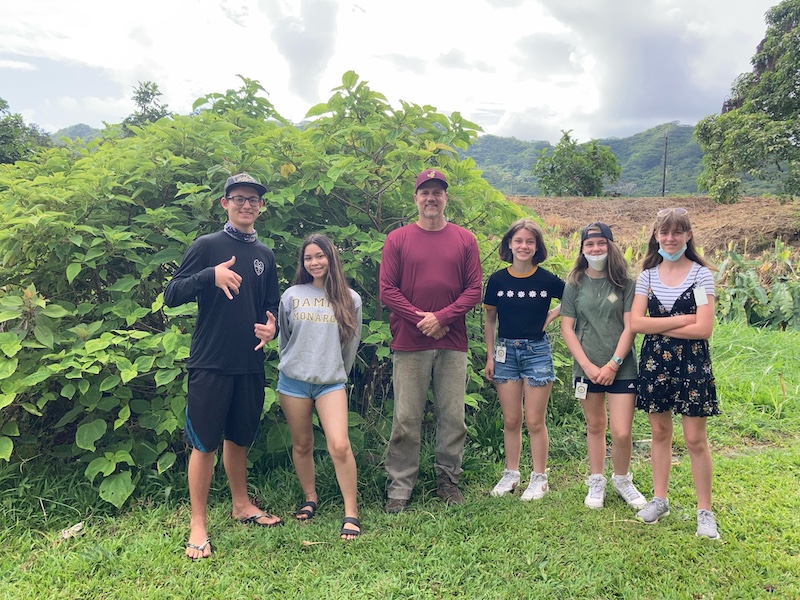






Carlos Kaukahi Severson
Ho’oulu ‘Ōpio: Castle High Schoolʻs Agriculture Program
By Renée Tillotson
Did you have any idea that Castle High School has a full-blown, 7-acre farm flourishing behind its campus in Kaneohe?!? I didn’t! When he took responsibility for the program eight years ago, Carlos Kaukahi Severson received from kupuna (respected elder) Piʻikea Miyamoto the name for the farm: Ho’oulu ‘Ōpio. Its meaning is to “Grow and Cultivate our Youth”, so he went a step further and named his pathway that as well; it succinctly paints the picture of the programʻs intentions for the ʻōpio (youth) that come through.
While reading the recent edition of our local Kaneohe Magazine, I was intrigued by an article on Castle High School converting bana grass into bio-fuel. I got even more interested when I realized that the teacher directing their Ag program – Carlos Kaukahi Severson – is part of our Still & Moving ‘ohana (extended family). His wife Maile Labasan Severson has taught yoga for us, and his daughter Tabbitha has danced in our keiki (children’s) hula program.
Castleʻs students learn to grow bana grass on their māla (farm or garden) as seedstock plants for Suma Farms, which collaborates with the students in several ways but primarily by coming to the school farm periodically to harvest living shoots of bana grass to stock Suma’s growing fields. Students will soon be able to watch Suma Farm’s soon-to-be-purchased “Digester” convert the sturdy grass into a sustainable biofuel. Kaukahi explains to his students how the Digester will work like a cow’s stomach, using bacteria to break down the bana grass and capture the natural gasses (like the gas that cows emit ) as a byproduct of their digestion. This will then be compressed and sold to Hawaii Gas Company.
Kaukahi’s students learn the importance of sustainable farming for people who live on islands in the middle of the Pacific Ocean. “If we can get more of our food and fuel needs met with our own agriculture at home”, Kaukahi teaches them, “we will be much more self-sufficient”. This effort aligns with the Hawaiian values taught at Ho’oulu ‘Ōpio, especially through working with crops such as kalo (taro), ʻulu (breadfruit) and ʻuala (sweet potato), which were staple carbohydrates in ancient Hawaiʻi.
In addition, the high school’s farm grows a plethora of local produce: banana, coconut, papaya, citrus and cacao, with lychee and mango in the near future. They stock a smaller garden with veggies and they are planting native trees to transform sections of their farm into native habitats. Their newest project entails getting their kitchen certified to sell poi from their poi mill and mamaki tea blends to the public.
Kaukahi’s career-track students take agriculture classes with him 2-3 times a week for three years as their CTE – Career and Technical Education – program, “bridging the gap between high school and postsecondary plans”. All students have access to farming as an elective class. Higher level classes are available for them to specialize or focus in on an area of interest for them, such as scientific crop research, irrigation design, landscaping design, crop production with sales, and collaboration with community partners such as Waikalua Loko Iʻa (fish pond). Ag pathway students engage in papahana (projects) that teach them how to plan and execute a project from beginning to end, which sometimes requires writing grants to obtain funds from partners such as Kokua Hawaii Foundation and Ko’olau Pilina Fund.
Two Ho’oulu ‘Ōpio students showed my three junior high school nieces around the garden this week, and our girls were blown away: “Spectacular – It’s like a hidden farm. Hard to believe it’s part of a high school! And the students had lots of ownership, saying ‘This is my area. This is what I take care of.’ ”
“Awesome. So cool to see a high school with programs for students to be productive in their adult lives!”
“I loved it. The kids not only had a great time farming, they were also in charge of little sections of the farm and figured out how to make and sell products from their section. One group grew mamaki and ginger plants that they made into tea and sold to the teachers to make a profit for the garden.”
My heart swells hearing about this future-affirming program at Castle High School that Kaukahi, his ag students, their supportive community partners, and the ‘aina are growing, together.

Get the Still & Moving App
This post is also available in: 日本語 (Japanese)

